- Home
- Bruce, Leo
Case for Sergeant Beef Page 12
Case for Sergeant Beef Read online
Page 12
The clerk pulled open a drawer in which we could see a number of spools of the pink tape and handed one to Beef, who solemnly examined it.
‘Mind if I keep this?’ he asked. ‘I want it for a bit of a lark. Red tape, you know!’
‘It’s not easy to get,’ said the clerk dubiously.
‘You got plenty.’
‘Oh, very well,’ said the clerk rather sulkily, and turned with marked concentration to his work.
Soon after that a buzzer sounded and we were shown in to Mr Aston.
The solicitor was a grey and portly man with hornrimmed glasses and a very smart suit. He affected, I thought, to be busier than he was, and quickly asked what he could do for us.
‘It’s about this murder,’ said Beef.
‘Shoulter?’
‘Ah.’
‘I know nothing about it.’
‘You have a client called Wellington Chickle, I believe?’ said Beef solemnly.
‘I have. At least I have undertaken one matter for Mr Chickle.’
‘And the nature of that matter?’ asked Beef.
The solicitor stared at him,
‘On what possible grounds do you put such a question?’
‘Investigating. Representing the dead man’s sister.’
‘Am I expected to see some connexion between that and my client?’
‘Just wanted to know whet he came to see you about,’ said Beef, rather abashed.
‘Then I’m afraid your curiosity – I can scarcely call it anything else – will remain unsatisfied. Mr Chickle’s business was confidential.’
‘I see. And where were you that afternoon?’
The solicitor looked up sharply.
‘I don’t think I can have heard you correctly,’ he said.
‘You heard. I asked where you was on the afternoon when Shoulter was murdered. You live out that way, I believe.’
Mr Aston pressed his buzzer and his clerk appeared.
‘Show these men out and don’t admit them again,’ he snapped.
I wondered whether to attempt some kind of explanation or apology for Beef’s gross blunder. But he was signing to me from the door and I followed him from the room in confusion. To my annoyance Beef had no sooner reached the street than he started laughing.
‘What on earth made you put that idiotic question?’ I demanded.
‘I thought you’d like another suspect,’ grinned Beef. I did not reply.
Back in Barnford we went at about four o’clock to the house of Mr and Miss Packham. They received us in a friendly manner, which did not seem to chill even when Beef began by saying that he had come to ask a favour.
‘We’re used to that,’ said the curate. ‘What is it this time?’
‘I understand you run a troop of Boy Scouts?’
‘I do.’
‘I was wondering if they could do a little job for me. Sort of good deed, you know.’
‘What sort of job?’
‘Well. I want them to search a certain area.’
‘Footprints?’
‘No. Not footprints. If you would not mind I would explain to them myself what I want. How would that be?’
Mr Packham considered.
‘Nothing against the Law, I take it?’
‘Oh, no. They would be helping the Law.’
‘No danger? None of your murderers about?’
‘No danger,’ promised Beef.
‘Then I don’t see why not. It’s a Scout Night to-night. You could come along to the Lady Flitch Hall and explain just what you want.’
Suddenly both brother and sister assumed an attitude of attentive listening. They were quite motionless, staring before them. I tried to speak, but received a vicious ‘Sshh!’ from Miss Packham.
‘What is it?’ Beef inquired.
‘Tea!’ shouted the curate’s sister. ‘I heard the rattle of cups!’
‘Stay and have some?’ said the curate very tentatively.
‘I think we’ll go back to our own place,’ said Beef with unusual tact. ‘They’ll be expecting us. See you at the Hall at-what time?’
‘Six. Six,’ Mr Packham’s manner had become absent.
At six o’clock, therefore, I accompanied Beef to the hall, and we found ourselves surrounded as we entered by countless small boys, some of them wearing the uniform of Scouts. I felt very self-conscious, for I knew that on such occasions Beef was apt to pose a good deal, and to talk to the boys as benevolent schoolmasters or cheerful uncles talked in the boys’ stories of half a century ago. This is not well received by modern boys who expect a man-to-man form of address.
As we entered we found that Mr Packham was deeply engaged with a few youngsters who seemed to know the way to his heart. One had brought him half a dozen eggs and another a pair of stored apples with skins wrinkled from a stay in some straw-covered loft. There were two other packages the precise contents of which were not apparent though guessable.
‘Splendid. Splendid,’ he was saying. ‘Good chaps. Most grateful. My sister will appreciate these. Hullo, here’s Sergeant Beef.’
There was a good deal of fuss and movement in the hall before the boys could be got into the chairs facing the platform, but it was achieved eventually, and Mr Packham rose to lecture them. He explained that they were going to be addressed by a real London detective, a description at which I shivered. Indeed, the whole proceedings seemed to me silly in the extreme. Whatever Beef wanted, I could not see that a lot of little boys running about thinking that they were sleuths would help much, and I was frankly nervous when I thought how Beef would address them. My worst fears were realized. When Mr Packham had finished he stood up and sticking his thumbs in the arm-holes of his waistcoat turned to the troop.
‘Boys,’ he said. ‘Would you like to help me catch a murderer?’
He pronounced the word as though he were a comedian giving an imitation of an old-fashioned melodrama, dragging out the first syllable through a series of vowels. To my surprise there was a murmur of eager assent.
‘If you’ll do what I ask you,’ he went on, ‘you may be the means of bringing him to the gallows. All I need now is a little more evidence and you can help me get it.’
This clumsy approach seemed to appeal to the boys, who looked keen and eager.
‘I want you to comb Deadman’s Wood,’ said Beef. ‘Every inch of it.’
He paused for effect.
‘Split up into parties,’ he said. ‘Organize yourselves. See that not a little piece of ground escapes you. And pick up anything you find. It’s no good looking for footprints. They’ve all gone by now. But anything else. Anything else at all you may find you bring to this hall to-morrow night. Got the idea?’
They had. There was a rustle and chatter of expectation.
‘And there’s something else,’ Beef continued. ‘I want you to look at the barks of the trees all round that bungalow where Mr Chickle lives. Say up to twenty yards from there. See if you can find one that’s split about a bit. You might. I don’t say you will. But you might. The boy who finds that gets a reward. And one for any boy who finds anything in the wood that’ll help me with my investigations. Now are there any questions you would like to ask?’
One boy wanted to know what they were to look for in particular.
‘Ah,’ said Beef. ‘I can’t tell you that for the very good reason that I don’t know myself. You just keep your eyes skinned.’
‘Who did it?’ asked a thin boy with glasses.
‘That’s what you’re going to help to find out,’ returned Beef. ‘Now off you go and divide it all up into squares. And plan out how you set about it. We’ll meet here to-morrow night. All right?’
There was a shout of excitement as the meeting broke up.
CHAPTER NINETEEN
Night in Deadman’s Wood
‘GOT a torch?’ asked Beef after our meal that evening.
‘Yes.’
‘And some nice warm clothes?’
‘I’ve got a gr
eatcoat. Why?’
‘We may be out all night.’
‘What on earth for?’
‘You wanted action, didn’t you?’
‘Yes, but I don’t want to fool about all night for nothing.’
‘I don’t think it will be for nothing. Now look here – this case is more interesting than you think. It’s a nasty business and we’re going to find out the truth. It’s all very well for you to think of it as nothing but a story -I tell you that there has been some clever and some dirty thinking done and, after all, a pretty violent crime. What we see to-night, if it happens as I think it will, is going to bring us a lot nearer the truth. And I’m serious about it.’
‘That’s fine. By the way you’ve been clowning about with Boy Scouts –’
‘Those kids are going to be useful – even if they find nothing, as I think you’ll see presently.’
‘Well, since you won’t even tell me whom you suspect I can only take your word for that.’
‘It’s not as easy as just suspecting someone. There are several people involved in this business – some of them innocent, perhaps. And as to suspecting, you know everything I know, so your suspicions are as good as mine. Well, I’ve never let you down yet, have I? You come along with me to-night and you may see something.’
‘Very well. Where are we going?’
‘To call on Mr Chickle, of course.’
I let the ‘of course’ pass, and prepared to follow Beef, accepting his suggestion of warm clothes and a torch. He himself had a woollen scarf round his neck when we set out. It was a dark night with a thin chilly drizzle from low clouds. We needed our torches to find the footpath across to Mr Chickle’s house. I trudged along, taking care not to slip on the sticky ground and not attempting to get more information from Beef, since I know from experience that it is useless to catechize him.
We found ‘Labour’s End’ to be well lighted, and I was glad of its cheerful aspect as we approached. But I thought there was something sinister about the gaunt figure of Mrs Pluck when she opened the door to us. She stared at us without speaking, and I’m sure there was fear in her big, hollow eyes. I had the impression that she found our visit unwelcome, though half-expected, and that she was relieved when Beef asked to see Mr Chickle.
The old gentleman was sitting beside a large fire when we entered his cosy book-lined room, and rose to greet us. In his manner, too, I sensed something strange, though with him it certainly was not fear.
Beef spoke as respectfully and politely as I could wish. He called Mr Chickle ‘Sir’, and said that he had come to warn him that his peace would probably be disturbed on the following day by an invasion from Boy Scouts.
Mr Chickle beamed and assured Beef that so far from disturbing him it would be a pleasure. As he grew older, he said, he liked more and more to see young people enjoying themselves, and it would not be the first time that the Scouts had played Cowboys and Indians in the wood.
‘They won’t be playing Cowboys and Indians this time,’ said Beef rather harshly. ‘They’ll be doing a little job for me.’
Mr. Chickle seemed amused and mildly interested, and wondered if ‘detectives and criminals’ was a new variation of the game.
‘In a way you might say so,’ said Beef. ‘What they’re going to do is to search every inch of Deadman’s Wood in parties. Every inch of it. And bring me whatever they find.’
‘And what will they find?’ asked Mr Chickle blandly.
‘I shouldn’t be surprised but what they might find something that will help to clear up this murder case.’
‘Yes. I see. A clue, in fact?’
‘Perhaps a clue.’
‘It’s very good of you to have come up to tell me,’ smiled Mr Chickle.
‘Well, we were on our way back from Copling, sir. I thought we would just call in.’
And Beef almost literally licked his chops just as a village policeman might when he has brought back a straying dog to his owner and expects to be offered a drink. Mr Chickle was not slow to perceive what Beef expected of him.
‘A drink, Sergeant?’ he suggested. ‘I have a little reserve of Scotch, I’m glad to say.’
‘I don’t mind if I do, sir,’ said Beef inevitably, and before long we were wishing good health to our host. But we did not linger for more than a few moments over the drink. Beef remembered that we had a darts match at our inn, and after cordial good nights we started towards Barnford.
But we had not gone more than fifteen yards when Beef stopped round the bend of a curve.
‘Now,’ he said, ‘we go back and wait. If anyone comes out of the door of that house we follow him or her. But we don’t get ourselves seen or heard until I speak out. Got it?’
It is at moments like this that Beef is at his best. In spite of his age and bulk – for he is close on fifty now and a heavy and powerful man at that – he can move as swiftly and silently as some great feline. He ceases to be the ungainly overgrown boy that I sometimes think him, and becomes genuinely a man of action. I am the first to criticize Beef, but I always admit that in an emergency his nerve and quickness of action are remarkable.
In the drizzle and darkness of that night he led the way to a point from which, while remaining concealed ourselves, we could watch both the front door and back door of ‘Labour’s End’. And there we stood, sheltered a little from the cold moisture of the night, but still wet, chilled, and uncomfortable for the best part of an hour. Beef discouraged me even from whispering, and when I signed to him that I would like to smoke a cigarette, he shook his head vigorously. I had begun to think that he had miscalculated and that our wet vigil was to be in vain, when some lights were switched out in the house, and a few moments later we saw the small figure of Mr Chickle in the open doorway outlined against the only light left burning within. He had opened the front door noiselessly and was engaged in closing it in silence.
‘Ready?’ whispered Beef.
When the little man started up the path which led to Miss Shoulter’s home, we were behind him. I followed Beef as he dodged behind trees in his advance, keeping us out of sight and hearing, but never losing sight of Chickle. It was exhausting and difficult, but at least it was what I had demanded of Beef – it was action.
Presently Beef, who was ahead of me and could see our quarry, stopped. For some minutes I had been unable to catch more than a glimpse of Mr Chickle and had been satisfied to leave observation to Beef while I concentrated on moving in silence and remaining unseen. It appeared now that Beef was annoyed by something that had happened on the path ahead.
‘He’s dived into the wood,’ he whispered to me. ‘Can’t follow him there. Just have to wait here and chance it.’
‘Chance what?’
‘You’ll see.’
Again there was a long uncomfortable wait. My feet felt as though they had been pushed into a ‘Frigidaire’ for several hours, and I was longing for a smoke. Beef, however, seemed to strain his eyes in watching the path ahead, never moving from beside me and never turning away. Ten or fifteen minutes must have passed.
Suddenly, Beef began to walk forward, no longer dodging among the trees, and at the same time flashed his powerful torch far down the path ahead. In its beam I could see Mr Chickle coming towards us. Beef was talking loudly to me.
‘We shall have to hurry,’ I heard him say. ‘Ah, here’s Mr Chickle. Why, you’ve dropped your parcel, sir. There it is just in the grass behind you.’
‘So I have,’ said Mr Chickle.
Beef stooped to pick up the little bundle which had been dropped. It consisted of something wrapped in a piece of mackintosh. Beef handed it politely to Mr Chickle.
‘Thanks, thanks. It really doesn’t matter. Very much obliged to you.’
I had never seen the little man in such a state of confusion.
No one moved for a few moments. Then Mr Chickle seemed to pull himself together.
‘Darts match cancelled?’ he asked. There was nothing openly sarcastic in his to
ne, but I felt that it was not quite natural.
‘Yes. The other side never turned up.’ It was funny, I thought, that it was Beef who did the explaining of our presence there, and Chickle who said nothing to justify his.
‘To tell you the truth, sir,’ Beef went on. ‘We have just heard a bit more from the police. We were on our way to call on Mr Bridge.’
Mr Chickle became animated.
‘Mr Bridge, eh? I told you he was a violent young man.’
‘Ah,’ said Beef. ‘You’ve been having a stroll yourself, sir?’
Mr Chickle seemed to be deciding whether or not he should speak.
‘Yes, Sergeant. And to tell the truth, I’ve made a very curious discovery. I was going to keep it for the police, but since you’ve come along so opportunely, I may as well tell you first.’
‘Very much obliged to you.’
Mr Chickle began to unroll the mackintosh of his parcel and revealed the largest pair of woman’s shoes I have ever seen.
‘Well, I never!’ said Beef. ‘Miss Shoulter’s, I take it?’
‘They were Miss Shoulter’s,’ said Mr Chickle, who seemed now to have recovered himself. ‘They were made especially for her. Outsize, you know. But they have been in my possession since then. I had to purchase them in a lot at one of our worthy curate’s auctions. What I cannot understand is this. Two months ago I myself put these shoes in my own dustbin, expecting, I might say hoping, never to set eyes on them again. And to-night while I’m taking the litde stroll I have for the sake of sound sleep, I find them wrapped in this piece of old mackintosh beside the footpath. How do you account for that?’
‘Funny,’ was Beef’s comment.
‘Do you think it has any connexion with the crime?’
‘Hard to say,’ said Beef. ‘Very hard to say.’
A few minutes later we left him, this time to go home and sleep, I hoped. I know that when at last we reached our inn, having waited another half-hour in the cold and rain to make sure that we should not have another encounter with Chickle, I was pleased to get between the sheets. But Beef had been chuckling to himself with pleasure all the way home.

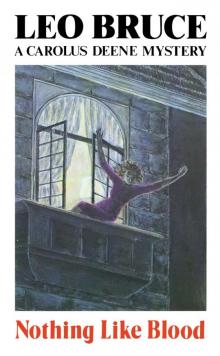 Nothing Like Blood
Nothing Like Blood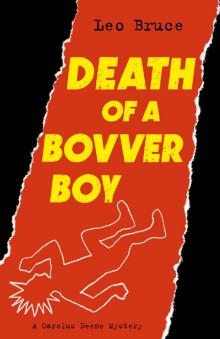 Death of a Bovver Boy
Death of a Bovver Boy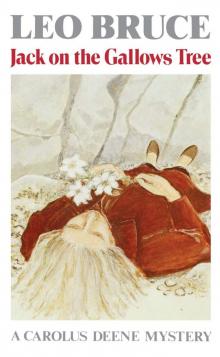 Jack on the Gallows Tree
Jack on the Gallows Tree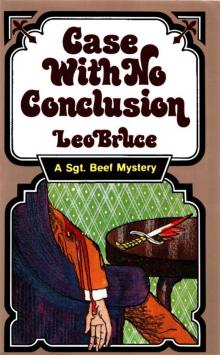 Case with No Conclusion
Case with No Conclusion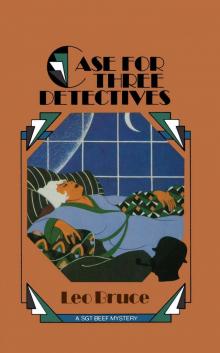 Case for Three Detectives
Case for Three Detectives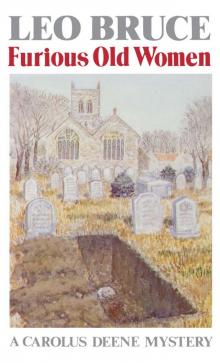 Furious Old Women
Furious Old Women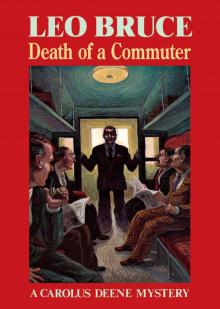 Death of a Commuter
Death of a Commuter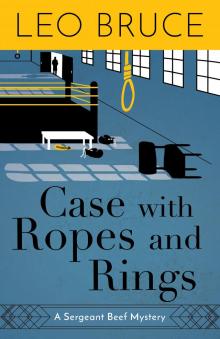 Case with Ropes and Rings
Case with Ropes and Rings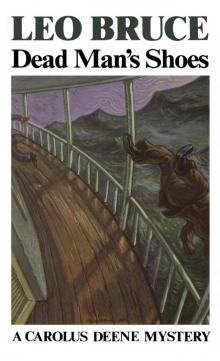 Dead Man’s Shoes
Dead Man’s Shoes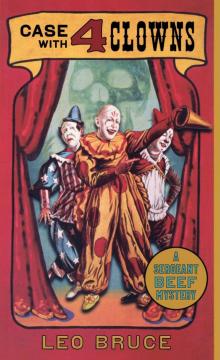 Case with 4 Clowns
Case with 4 Clowns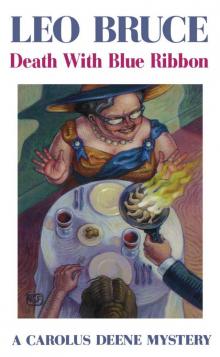 Death with Blue Ribbon
Death with Blue Ribbon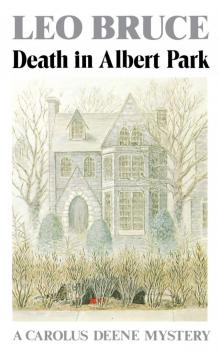 Death in Albert Park
Death in Albert Park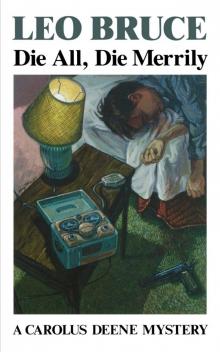 Die All, Die Merrily
Die All, Die Merrily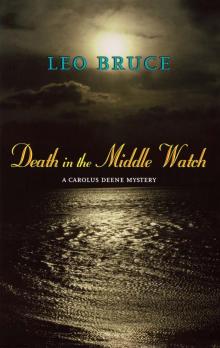 Death in the Middle Watch
Death in the Middle Watch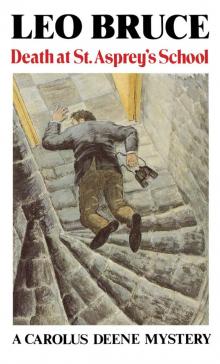 Death at St. Asprey’s School
Death at St. Asprey’s School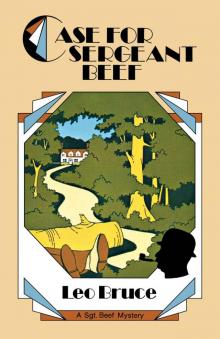 Case for Sergeant Beef
Case for Sergeant Beef